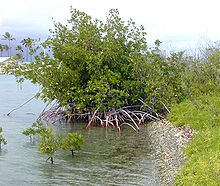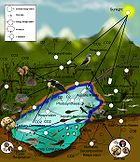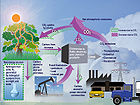- Dominance (ecology)
-
For other uses, see Dominance.
Ecological dominance is the degree to which a species is more numerous than its competitors in an ecological community, or makes up more of the biomass. Most ecological communities are defined by their dominant species.
Examples
- In heathland the dominant species are characteristically one or more species of heather or related plants.
- In many examples of wet woodland in western Europe, the dominant tree is alder (Alnus glutinosa).
- In temperate bogs, the dominant vegetation is usually species of Sphagnum moss.
- On Earth, arguably, a large amount of its land ecosystems are dominated by human beings, making human beings the ecologically dominant species over much of the planet.
- Tidal swamps in the tropics are usually dominated by species of mangrove (Rhizophoraceae)
- Some sea floor communities are dominated by brittle stars.
- Exposed rocky shorelines are dominated by sessile organisms such as barnacles and limpets.
See also
- National Vegetation Classification, a system for classifying British plant communities by their dominant species
Categories:- Habitats
- Ecology stubs
Wikimedia Foundation. 2010.



